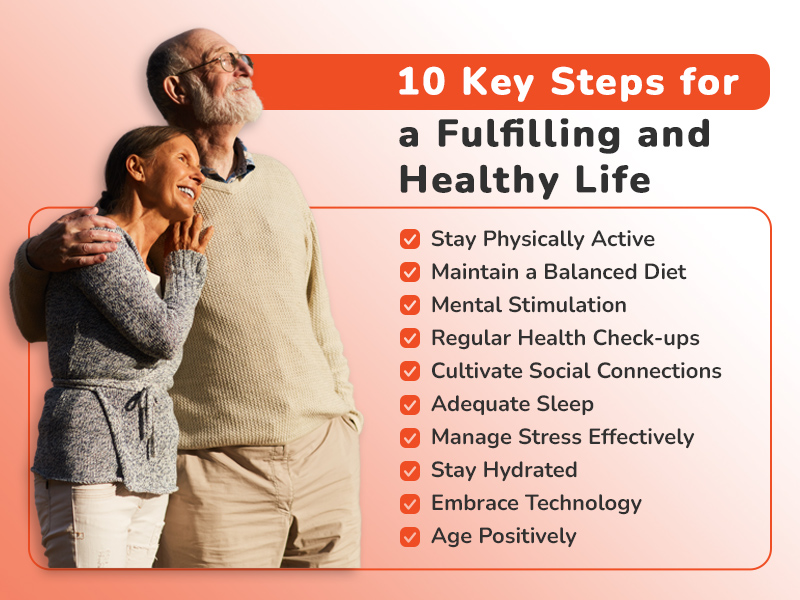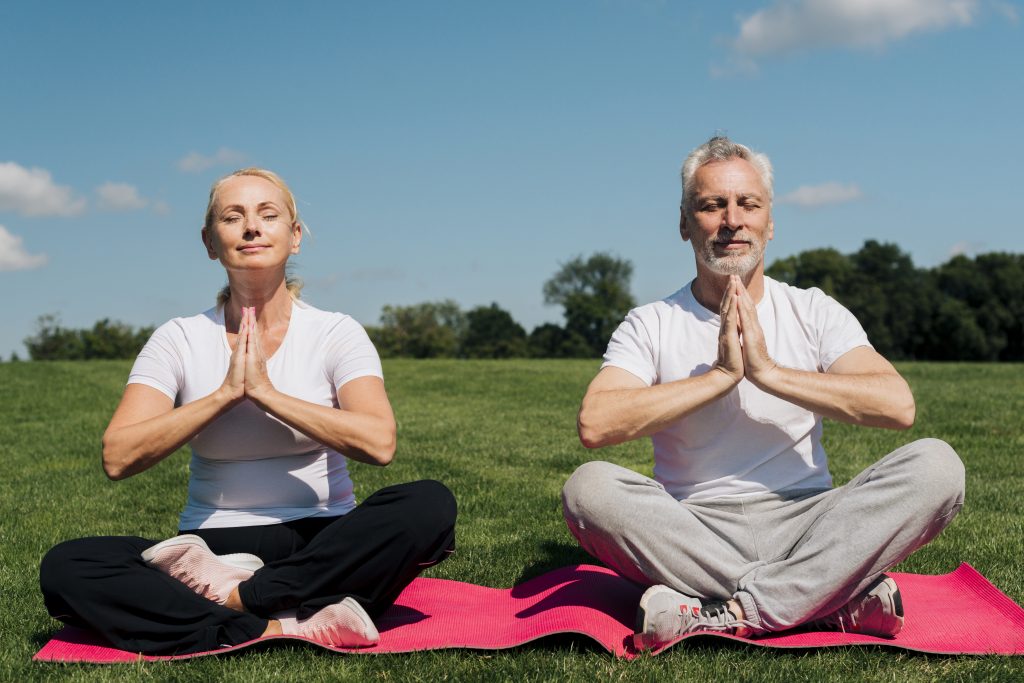Aging Gracefully: 10 Key Steps for a Fulfilling and Healthy Life
Ageing gracefully is about embracing the passage of time with positivity and proactivity. It’s a phase that can be filled with wisdom, contentment, and a deeper appreciation for healthy life. This article will guide you through 10 vital steps to a healthy life and a happy and fulfilling ageing process. It’s not merely about longevity but about enhancing the quality of life in your later years. These steps, rooted in holistic wellness practices, nourish the mind, body, and spirit. They ensure that seniors can enjoy their golden years with vitality and enthusiasm, making each moment count.
10 Key Steps for a Fulfilling and Healthy Life

1. Stay Physically Active
Embracing physical activity is key to ageing healthily. As we grow older, our bodies require regular movement to preserve muscle strength, maintain flexibility, and ensure balance. Engaging in physical exercise doesn’t just benefit the body; it also has a profound impact on mental health, boosting mood and cognitive functions.
- Cardiovascular Exercise: Activities like brisk walking, swimming, or cycling improve heart health and endurance. Aim for at least 150 minutes of moderate aerobic activity per week.
- Strength Training: Incorporating light weightlifting or resistance band exercises twice a week helps combat muscle loss and strengthens bones.
- Flexibility and Balance: Practices like yoga or tai chi enhance flexibility and improve balance, reducing the risk of falls.
Making exercise a regular part of your routine is not about intensity; it’s about consistency. Choose activities you enjoy, and remember, it’s never too late to start. Even simple daily activities like gardening or taking stairs count towards keeping you active and agile.
2. Maintain a Balanced Diet
Eating right is a cornerstone of healthy ageing. As our bodies evolve with age, so do our nutritional needs. A balanced diet becomes a powerful tool in maintaining health, vitality, and quality of life.
- Fruits and Vegetables: Aim for a colourful plate. Fruits and vegetables contain essential vitamins, minerals, and antioxidants that combat cellular ageing and support overall health.
- Whole Grains: Incorporate whole grains like oats, quinoa, and brown rice. They provide fibre, helping with digestion and keeping blood sugar levels stable.
- Lean Proteins: Opt for lean protein sources such as fish, poultry, beans, and legumes. These support muscle health and provide essential amino acids.
- Healthy Fats: Include sources of healthy fats like avocados, nuts, seeds, and olive oil. They are good for heart health and aid in nutrient absorption.
Hydration is equally important. With advancing age, the sensation of thirst may diminish, so it’s essential to drink enough fluids throughout the day consciously. Water, herbal teas, and hydrating fruits like watermelon and cucumber are excellent choices.
3. Mental Stimulation
The adage “use it or lose it” applies to maintaining cognitive health as we age. Mental stimulation keeps the brain active and agile, potentially slowing cognitive decline.
- Engage in Brain-Boosting Activities: Crossword puzzles, Sudoku, or chess challenge the brain, enhancing problem-solving skills and memory.
- Embrace Lifelong Learning: Picking up a new hobby, learning a new language, or attending workshops can stimulate new neural pathways. It’s never too late to explore a new interest or skill.
- Reading and Writing: Regular reading provides a wealth of knowledge and keeps the brain engaged and imagination active. Writing, whether journaling, creative writing, or even letter writing, is a fantastic way to articulate thoughts and memories, enhancing cognitive clarity.
- Social Interaction: Engaging in meaningful conversations and social activities can stimulate mental processes. Joining clubs, attending community events, or even regular interactions with family and friends can contribute significantly to mental health.
- Technology and Brain Training Apps: With advancements in technology, numerous apps are designed specifically for brain training. These can be a fun and convenient way to give your brain a daily workout.
Remember, keeping your mind active is not just about preventing decline; it’s about enriching your life experience at every age. A stimulated mind leads to enhanced creativity, better problem-solving abilities, and a more vibrant outlook on life.
4. Regular Health Check-ups
In the journey of ageing gracefully, preventive healthcare plays a pivotal role. Regular health check-ups and screenings are essential to catch potential health issues early when they are more manageable.
- Routine Screenings: Regular screenings for blood pressure, cholesterol levels, diabetes, and cancer can be life-saving. They help in early detection and timely intervention.
- Vaccinations: Keeping up with vaccinations, including flu shots and other age-appropriate vaccines, is crucial for preventing diseases.
- Open Dialogue with Healthcare Providers: It’s important to have honest conversations with your doctors about any health concerns. Discussing symptoms, lifestyle changes, and family health history helps them provide better care.
- Dental and Vision Exams: Regular dental check-ups and eye exams are as important as they can detect problems typical in older adults, such as glaucoma or periodontal diseases.
By prioritizing regular health check-ups, you safeguard your health and gain peace of mind, knowing that you are doing your best to maintain your well-being. Remember, prevention is always better than cure, especially as we age.
5. Cultivate Social Connections

Maintaining strong social connections becomes increasingly important for our overall well-being as we age. Loneliness and isolation can have significant negative impacts on both mental and physical health. Here’s how to keep those connections alive:
- Family and Friends: Regularly spend time with family members and friends. These relationships provide emotional support and contribute to a sense of belonging.
- Community Engagement: Get involved in community activities or groups. Engaging with others can be incredibly fulfilling, whether it’s a book club, gardening group, or volunteering.
- Join Interest Groups: Pursue hobbies or interests in a group setting. This can be an excellent way to meet new people with similar interests.
- Participate in Senior Programs: Many communities offer programs specifically designed for seniors, which can be a great way to meet others in the same stage of life.
- Stay Open to New Relationships: While cherishing old friendships, be open to forming new ones. Sometimes, new connections can provide fresh perspectives and energy.
Social connections are not just about having people around; they enrich our lives, provide emotional support, and enhance our sense of purpose. As we navigate the golden years, these relationships become our pillars, offering joy, comfort, and a vibrant social life.
Read More: The Comprehensive Guide to Ankle Braces for Sprain Recovery and Prevention
6. Adequate Sleep
Adequate sleep remains a cornerstone of good health, especially as we age. Here are key points to ensure restful nights:
- Regular Sleep Schedule: Try to go to bed and wake up at the same time each day to regulate your body’s clock.
- Comfortable Environment: Create a sleep-friendly environment. This means a comfortable mattress, minimal light, and a quiet room.
- Avoid Stimulants: Limit caffeine and heavy meals before bedtime as they can disrupt sleep.
- Wind-Down Rituals: Engage in calming activities, like reading or listening to soft music, to prepare your mind and body for sleep.
Aiming for 7-8 hours of quality sleep is ideal. Good sleep enhances mood, cognitive function, and overall physical health. It’s a key ingredient for ageing gracefully and healthily.
7. Manage Stress Effectively

Chronic stress can take a toll on your health. Managing stress is crucial for maintaining health and well-being in later years. Here’s how you can keep stress at bay:
- Mindfulness Practices: Engage in mindfulness or meditation. These practices can significantly reduce stress and improve mental clarity.
- Yoga or Gentle Exercise: Physical activities like yoga or tai chi are not just good for the body but also soothe the mind.
- Find Relaxing Hobbies: Whether it’s gardening, painting, or knitting, hobbies can provide a great outlet for stress relief.
- Socialize: Spending time with loved ones or engaging in community activities can uplift your spirits and reduce feelings of stress.
By incorporating these stress-management techniques into your daily routine, you can enhance your overall quality of life and navigate the ageing process with more ease and less anxiety.
8. Stay Hydrated
As we age, staying adequately hydrated becomes even more critical. Here’s why and how you can ensure proper hydration:
- Diminished Thirst Response: With age, our body’s ability to signal thirst may decrease, making it easy to forget to drink water.
- Regular Fluid Intake: Make it a habit to drink fluids regularly throughout the day. Carry a water bottle as a reminder.
- Monitor Hydration Levels: Pay attention to signs of dehydration, such as dry mouth, fatigue, or dizziness.
- Incorporate Hydrating Foods: Eating fruits and vegetables with high water content can also contribute to your hydration.
By consciously trying to stay hydrated, you can support your body’s overall health and functionality, which is vital for a fulfilling ageing experience.
9. Embrace Technology
Technology isn’t just for the young; it also holds immense benefits for seniors. Here’s how embracing technology can enhance life in your golden years:
- Staying Connected: Use smartphones and social media to keep in touch with family and friends. Video calls can be especially meaningful.
- Health Management: Explore apps that help track medications, appointments, and fitness goals.
- Access to Information: The internet is a vast resource for news, educational content, and entertainment.
- Convenience and Safety: From online shopping to emergency response systems, technology can offer both convenience and safety.
Adopting technology can significantly enrich your life, making daily tasks easier and keeping you engaged with the wider world.
10. Age Positively
The way you view ageing can dramatically shape your experience of it. Here’s why a positive outlook matters:
- Welcoming Growth: View each year as an opportunity for continued growth and learning. Embrace the wisdom and experiences that come with age.
- Celebrating Milestones: Instead of fearing age, celebrate the milestones. Each year brings its unique joys and achievements.
- Positive Mindset: Cultivating a positive mindset can lead to better health outcomes and a more fulfilling life.
Remember, ageing isn’t just about growing older; it’s about growing wiser and enjoying life’s journey with grace and positivity.
Conclusion
Ageing gracefully is about taking proactive steps toward a healthy life and a balanced lifestyle. By following these 10 steps, you can maximize your chances of enjoying your later years with vitality and joy. Remember, it’s never too late to start making positive changes for a better tomorrow.



